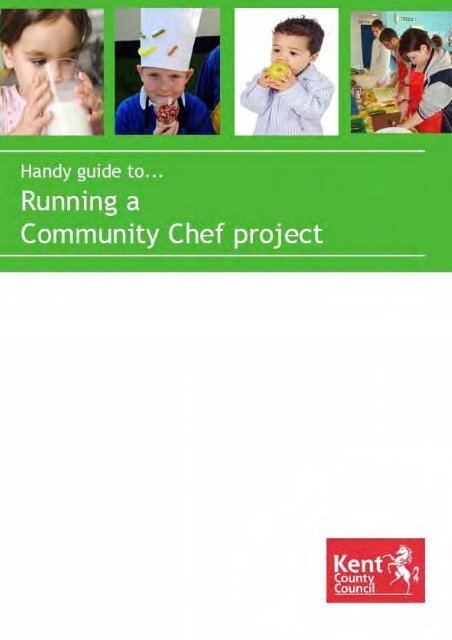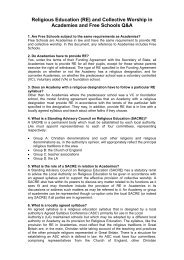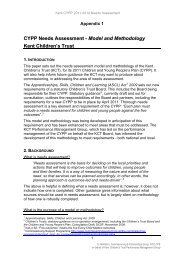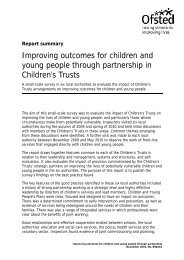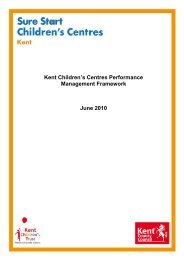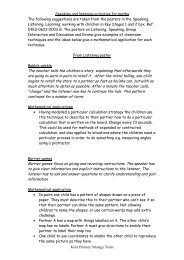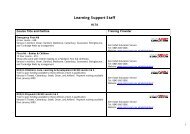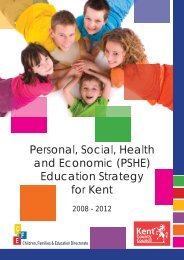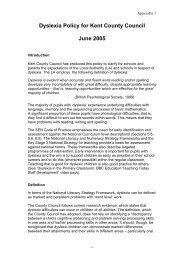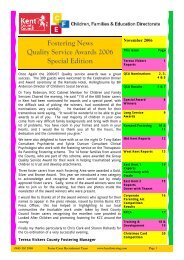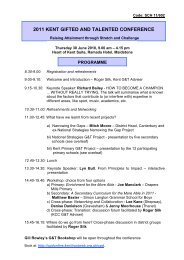Handy guide to... running a community chef project - Kent Trust Web
Handy guide to... running a community chef project - Kent Trust Web
Handy guide to... running a community chef project - Kent Trust Web
You also want an ePaper? Increase the reach of your titles
YUMPU automatically turns print PDFs into web optimized ePapers that Google loves.
In 2008 <strong>Kent</strong> County Council (KCC) launched two <strong>community</strong> <strong>chef</strong> pilots in <strong>Kent</strong>; one<br />
covering Dartford and Gravesham and the other covering the Isle of Sheppey. KCC<br />
provided funding for each <strong>chef</strong> for a year and evaluated the impact they had on their<br />
local communities.<br />
This <strong>guide</strong> is aimed at commissioners interested in <strong>running</strong> a similar <strong>project</strong> and<br />
provides advice and learning from KCC’s experience and the formal evaluation of the<br />
<strong>community</strong> <strong>chef</strong> pilots.<br />
What is a <strong>community</strong> <strong>chef</strong> <strong>project</strong>?<br />
A <strong>community</strong> <strong>chef</strong> is someone that provides free or very low cost cooking courses for<br />
members of a <strong>community</strong> <strong>to</strong> provide the <strong>community</strong> with the skills and knowledge <strong>to</strong><br />
prepare tasty, quick, low cost and healthy meals at home.<br />
A <strong>community</strong> <strong>chef</strong> also works with partners <strong>to</strong> identify and co-ordinate existing cookery<br />
initiatives <strong>to</strong> ensure that key <strong>community</strong> organisations work in partnership <strong>to</strong> pool<br />
resources and fill gaps in provision <strong>to</strong> meet the health needs of the <strong>community</strong>.<br />
Why are <strong>community</strong> <strong>chef</strong> <strong>project</strong>s useful?<br />
The Department of Health acknowledges that the perception that good food is more<br />
expensive and time consuming <strong>to</strong> cook is a barrier <strong>to</strong> a healthy lifestyle. A practical way<br />
<strong>to</strong> overcome barriers <strong>to</strong> healthy eating is <strong>to</strong> actively get parents and children cooking<br />
<strong>to</strong>gether.<br />
Community cookery clubs are not a new idea and have been used as a health<br />
promotion <strong>to</strong>ol for many years <strong>to</strong> teach about healthy eating and develop basic cookery<br />
skills. A Needs Assessment (unpublished) undertaken on the Isle of Sheppey by Swale<br />
PCT (now Eastern and Coastal <strong>Kent</strong> PCT) in 2005 found that residents highlighted<br />
cookery classes as the <strong>to</strong>p activity they would like <strong>to</strong> engage in <strong>to</strong> improve their health.<br />
This supported the 2001 Survey of Mothers carried out by Sheerness Children and<br />
Family Centre that found mothers believed they could adopt a healthier lifestyle by<br />
being provided with quick and easy meal ideas.<br />
Community <strong>chef</strong>s have been hugely successful in East Sussex and the Isle of Wight in<br />
equipping communities with cookery skills and healthy eating knowledge.
Setting up a <strong>community</strong> <strong>chef</strong> <strong>project</strong><br />
Preparation<br />
Before setting up a <strong>community</strong> <strong>chef</strong> <strong>project</strong> you need <strong>to</strong> consider the following:<br />
Location<br />
KCC found that working at a local level is key <strong>to</strong> a successful <strong>community</strong> <strong>chef</strong> <strong>project</strong>.<br />
Community <strong>chef</strong>s need <strong>to</strong> build up close working relationships with local partner<br />
organisations <strong>to</strong> maximise opportunities <strong>to</strong> use available resources such as kitchens<br />
and equipment for minimal or no cost. Covering <strong>to</strong>o large a geographical area means<br />
that the <strong>chef</strong> can not build the close personal relationships with members of<br />
communities who may benefit most from this type of <strong>project</strong>. Becoming established and<br />
building up trust in a local <strong>community</strong> is imperative. Additionally a <strong>chef</strong> covering <strong>to</strong>o<br />
large a geographical area will spend more time and expense in travel.<br />
Funding<br />
Consideration needs <strong>to</strong> be given <strong>to</strong> how the <strong>chef</strong> will be funded. Funding needs <strong>to</strong><br />
cover:<br />
Recruitment and advertising for the <strong>chef</strong><br />
Chefs salary, on costs and travel expenses<br />
Office costs<br />
Room hire, equipment, printed recipes and ingredients for cooking courses<br />
Publicity<br />
Some costs could be recouped such as charging a small fee for courses <strong>to</strong> cover<br />
ingredients or hiring the <strong>chef</strong> out at events <strong>to</strong> generate additional income. Sponsorship<br />
from local businesses, organisations and supermarkets may also be available. Funding<br />
may also be available from local partners.<br />
Partners<br />
To firmly embed the <strong>community</strong> <strong>chef</strong> in the local area KCC worked closely with partners<br />
from the start <strong>to</strong> encourage a sense of ownership of the <strong>project</strong> by the <strong>community</strong>. A<br />
<strong>community</strong> Food Partnership was established <strong>to</strong> plan, recruit and manage the work of<br />
the <strong>chef</strong> and included professionals from local <strong>community</strong> organisations such as PCTs,<br />
Healthy Living Centres, Children’s Centres, <strong>community</strong> centres, voluntary organisations,<br />
churches, GP surgeries, schools, elderly, homeless and housing associations. It was<br />
decided that the <strong>chef</strong>s should be hosted by the Healthy Living Centres who were well<br />
established in the <strong>community</strong> and could offer management and office space for the<br />
<strong>chef</strong>s. The advantage of involving local partners is that resources are more forthcoming<br />
and the <strong>chef</strong> will quickly became an accepted and established <strong>community</strong> member. By<br />
being involved partners are aware of the value of the <strong>chef</strong>, can promote the services<br />
offered and quickly establish an induction programme and work plan.
Venues and equipment<br />
The <strong>chef</strong> will need <strong>to</strong> have access <strong>to</strong> <strong>community</strong> venues providing cooking facilities <strong>to</strong><br />
run the cooking courses. These will need <strong>to</strong> be identified by partners before the <strong>chef</strong> is<br />
in post and hire rates (if applicable) negotiated, though hopefully partners will be able <strong>to</strong><br />
provide facilities for nothing or a nominal cost. Venues with cooking facilities may<br />
include early years’ settings, Children’s Centres, schools, youth clubs, churches,<br />
<strong>community</strong> centres, Healthy Living Centres, and homeless shelters.<br />
If local venues providing cooking facilities and equipment are limited the <strong>chef</strong> may need<br />
<strong>to</strong> be provided with portable cookers and equipment which will add <strong>to</strong> the cost of the<br />
<strong>project</strong>. Once in post the <strong>chef</strong> may also have some ideas about what equipment may<br />
need <strong>to</strong> be purchased so some budget may need <strong>to</strong> be held back.<br />
Recruitment<br />
It is worth involving the Food Partnership in the recruitment of the <strong>community</strong> <strong>chef</strong> <strong>to</strong><br />
encourage the members <strong>to</strong> engage with the <strong>project</strong>. In <strong>Kent</strong> partnerships were tasked<br />
with creating the job description and advertising, interviewing and selecting the two<br />
<strong>chef</strong>s.<br />
As a <strong>guide</strong> the <strong>chef</strong>s were required <strong>to</strong> have:<br />
at least five years experience of working in a catering environment<br />
experience of working with a cross-section of organisations and communities,<br />
including disadvantaged groups<br />
good working knowledge of principles of healthy eating and the national healthy<br />
eating agenda<br />
basic catering qualification and Basic Food Hygiene Certificate<br />
excellent communication and interpersonal skills.<br />
The first stage of the recruitment involved shortlisted candidates conducting an<br />
interactive cooking demonstration with an audience including future users i.e. elderly,<br />
children, people with special needs and professionals such as Environmental Health <strong>to</strong><br />
assess working practices. Successful candidates were then invited <strong>to</strong> interview<br />
conducted by a small panel of key partners who then based their decision on the<br />
cooking demonstration, audience feedback and interview.<br />
Who should cooking courses be aimed at?<br />
Almost any <strong>community</strong> group can benefit from a cooking course. The two <strong>chef</strong>s in <strong>Kent</strong><br />
ran courses with a variety of groups such as families, school children of all ages,<br />
adolescents, teenage parents, dads, homeless groups, pensioners, and British Minority<br />
Ethnic groups. Courses were adapted <strong>to</strong> suit the group so for instance the <strong>chef</strong> ran a<br />
beer and curry course for dads while concentrated on healthy weaning foods for parents<br />
of babies. Each course ran weekly for 6-8 weeks and lasted a couple of hours.
Sometimes participants would sit down and eat their meal once cooked and sometimes<br />
meals would be taken home <strong>to</strong> be enjoyed that evening by the whole family.<br />
Advertising<br />
Advertising the cooking courses can be greatly enhanced by setting up a Food<br />
Partnership and including all key local partners in the planning, recruitment and<br />
development of the pilot. Partners are likely <strong>to</strong> include professionals from the local<br />
health, education and <strong>community</strong> sec<strong>to</strong>rs which enables direct links with parents-<strong>to</strong>-be,<br />
families, adolescents in housing <strong>project</strong>s, the elderly, people with special needs etc.<br />
The personality of the <strong>chef</strong> is also crucial so it is important <strong>to</strong> recruit a <strong>chef</strong> with the<br />
personality and ability <strong>to</strong> engage and enthuse people of all ages and backgrounds.<br />
The best way for the <strong>community</strong> <strong>to</strong> learn about the <strong>chef</strong> is <strong>to</strong> see the <strong>chef</strong> in action.<br />
Chefs should attend <strong>community</strong> events such as festivals and run demonstrations <strong>to</strong><br />
further create awareness.<br />
Sustainability<br />
Because a <strong>project</strong> like this does have cost implications it is important <strong>to</strong> consider future<br />
sustainability. The Food Partnership should support the <strong>chef</strong> in finding opportunities <strong>to</strong><br />
generate income, future funding and sponsorship where possible. As well as <strong>running</strong><br />
cooking courses the <strong>chef</strong> should look <strong>to</strong> train <strong>community</strong> volunteers <strong>to</strong> support the work<br />
of the <strong>chef</strong> and <strong>to</strong> set up cooking clubs for those who have participated in a cooking<br />
course.<br />
How <strong>to</strong> set up and run a <strong>community</strong> <strong>chef</strong> <strong>project</strong> - checklist<br />
1. Select the location for the <strong>project</strong><br />
2. Identify funding for the <strong>project</strong><br />
3. Set up a Food Partnership<br />
4. Identify venues and equipment<br />
5. Recruit a <strong>chef</strong><br />
6. Plan and run cooking courses<br />
7. Consider sustainability<br />
Resources<br />
The <strong>community</strong> <strong>chef</strong>s worked with KCC <strong>to</strong> create 52 seasonable simple recipe cards<br />
based around common fruits and vegetables. These are available <strong>to</strong> download for free<br />
LINK.<br />
What the research says<br />
The pilot was a success and the two <strong>chef</strong>s reached over 3000 people during the one<br />
year pilot phase.
After attending cooking courses there were improvements in healthy eating knowledge<br />
and behaviour with more people:<br />
reading food labels<br />
eating a healthy diet<br />
cooking and using recipes<br />
For more information please see the Community Chef Evaluation Report.<br />
What we learnt<br />
Food Partnerships were important in driving the <strong>project</strong> forward but natural wastage<br />
meant the partnerships did reduce leaving a burden on existing members. New<br />
members need <strong>to</strong> be recruited <strong>to</strong> ensure the partnerships maintain momentum.<br />
Labelling the cookery courses as healthy eating could be off-putting <strong>to</strong> some<br />
participants.<br />
The personality of the two <strong>chef</strong>s was the most important fac<strong>to</strong>r in the success of the<br />
cooking courses.<br />
Getting families <strong>to</strong> cook <strong>to</strong>gether was a particularly effective way <strong>to</strong> get healthy<br />
eating messages across.<br />
Participants were disappointed when the course was over and wanted an<br />
opportunity <strong>to</strong> continue attending longer term. The <strong>chef</strong>s felt a solution would be <strong>to</strong><br />
offer follow-up courses, or create a permanent cooking base in the communities (i.e.<br />
a <strong>community</strong> food hub) which would provide a central focus for food and cooking in<br />
the communities where people could interact with <strong>chef</strong>s and get involved in cooking<br />
as and when they wanted.<br />
Top tips<br />
Allow plenty of time <strong>to</strong> plan a <strong>community</strong> <strong>chef</strong> <strong>project</strong> and set up a Food Partnership.<br />
Funding needs <strong>to</strong> last longer than a year <strong>to</strong> enable <strong>chef</strong>s <strong>to</strong> have the capacity <strong>to</strong> set<br />
up long term cookery clubs and train volunteers.<br />
Be as clear as possible with partners at the outset about expectations and what<br />
involvement in partnerships will entail.


